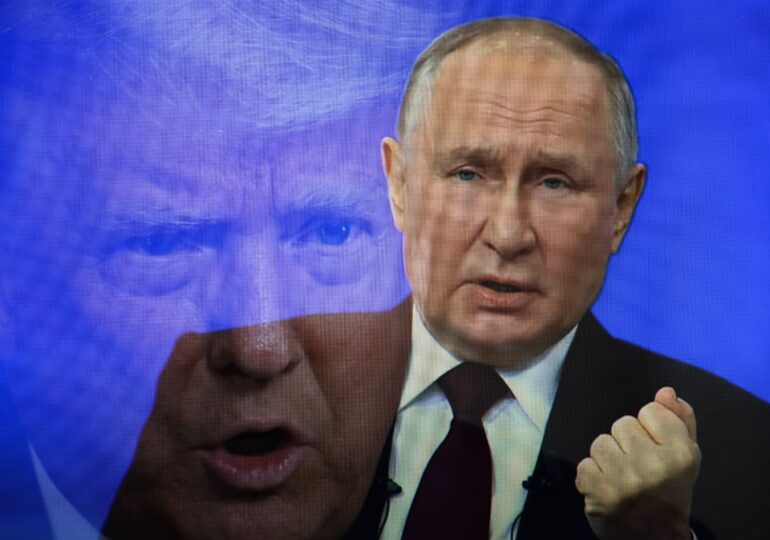Is the relationship between Donald Trump and Vladimir Putin on a downward slope? A popular newspaper in Russia believes so and uses a railway metaphor to illustrate the current state of Russian-American relations.
„A head-on collision seems inevitable,” wrote the tabloid Moskovski Komsomoleț recently.
"The Trump locomotive and the Putin locomotive are heading towards each other at speed. And neither shows any signs of slowing down or backing off."
In the case of the "Putin locomotive," the train is moving at full speed ahead, along with the so-called "special military operation" - Russia's war in Ukraine. The Kremlin leader does not seem willing at all to end hostilities or accept a long-term ceasefire.
Meanwhile, the "Trump locomotive" is increasing pressure on Moscow: setting deadlines, issuing ultimatums, threatening with new sanctions, and imposing high tariffs on Russia's trading partners like India and China, write journalists BBC in an in-depth analysis.
To all this, the move of two American nuclear submarines closer to Russia is added, according to statements by Donald Trump.
When the discussion shifts from locomotives to nuclear submarines, things become serious.
But does this mean that the US is on a "collision course" with the Kremlin because of Ukraine?
Or does the visit this week to Moscow by Trump's special envoy, Steve Witkoff, suggest that, despite tough rhetoric, a ceasefire agreement is still possible?
A warm start after Trump's return to the White House
In the first weeks of Trump's second term, it seemed that Moscow and Washington were about to revitalize their bilateral relations.
No sign of collision. On the contrary, at times it seemed that Vladimir Putin and Donald Trump were in the same car, heading in the same direction. In February, the US sided with Russia at the UN, opposing a European resolution condemning Russia's "aggression" in Ukraine.
In a phone call that same month, the two presidents discussed reciprocal visits to their countries. A Trump-Putin summit seemed imminent.
At the same time, the Trump administration was putting pressure on Kiev, not Moscow, and was in conflict with traditional US allies like Canada or Denmark. American officials vehemently criticized NATO and European leaders.
All of this sounded like pleasant music to the Kremlin.
"America now has more in common with Russia than with Brussels or Kiev," said political scientist Konstantin Blohin in March to the newspaper Izvestia.
A month later, the same newspaper was jubilant: "The Trumpists are revolutionaries. They are system destroyers. We can only support them. Western unity no longer exists. Geopolitically, the alliance is dead. Trumpism has rapidly and surely destroyed transatlantic consensus."
Putin offers a portrait, Trump wants a ceasefire
Meanwhile, Steve Witkoff - Trump's special envoy - became a frequent visitor to Moscow. He made four visits in just two months, spending hours in discussions with Putin. After one of the meetings, the Kremlin leader offered a portrait of Donald Trump to take to the White House.
According to sources, the American president was "visibly moved" by the gesture.
However, Trump wanted more than a gift - he wanted Putin to accept a complete and unconditional ceasefire in Ukraine.
Trump's growing frustration
Confident that Russia holds the initiative on the front, Putin has been reluctant to stop the fight, although he claims that Moscow is open to a diplomatic solution.
This attitude has increasingly frustrated Trump. In recent weeks, he has condemned Russian attacks on Ukrainian cities, calling them "disgusting" and "scandalous," and accused Putin of "talking nonsense" about Ukraine.
Last month, Trump gave Russia a 50-day ultimatum to end the war - a deadline he later reduced to 10 days. It expires at the end of this week. So far, Putin does not seem to give in.
But how much pressure is the Kremlin really feeling?
An agreement is still possible
Even though everything seems to be heading towards a head-on collision between Trump and Putin, all is not lost.
Trump considers himself a great negotiator and, apparently, still hopes to reach an agreement with the Kremlin leader.
Steve Witkoff is set to return to Russia this week. It is unknown what proposal he will bring, but some commentators in Moscow believe it will be more of a "carrot" than a "stick." It did not go unnoticed that on Sunday, Trump stated that Russia "seems to be doing quite well at avoiding sanctions."
On Monday, Ivan Loșkarev, a professor of political theory at MGIMO University in Moscow, told Izvestia that, to facilitate dialogue, Witkoff could offer "cooperation benefits that would open up after an agreement on Ukraine."
Will this be enough to convince the Kremlin to stop the war, after three and a half years? Nothing is certain.
Putin has not given up his maximal demands regarding territories, Ukraine's neutrality, and limiting the size of the Ukrainian army.
Trump wants an agreement. Putin wants victory.

